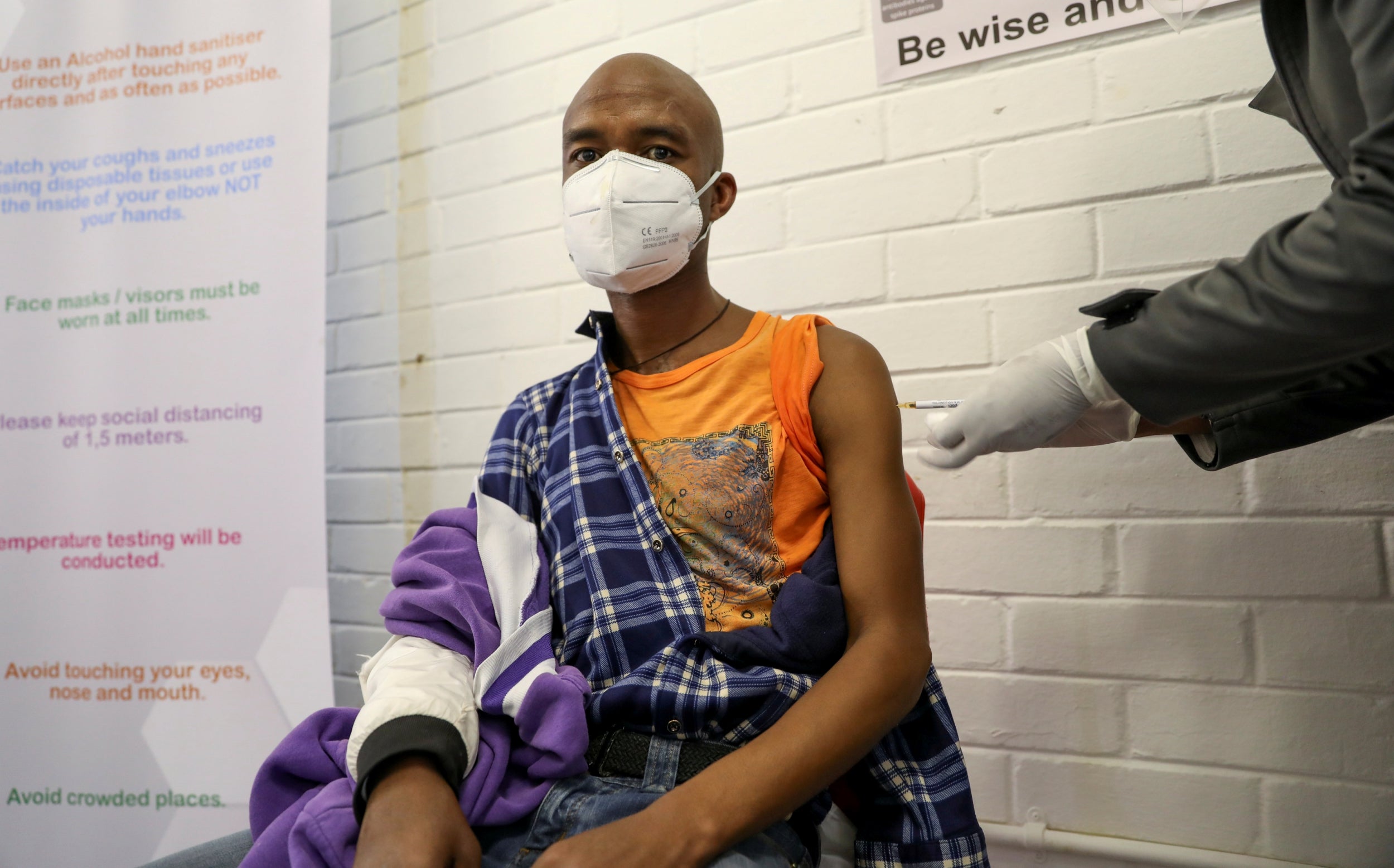EU nationals are in danger of slipping through the cracks of the government’s Brexit registration scheme and turning into another Windrush-style scandal, citizens’ groups have warned.
MPs on the EU future relationship committee were told by community groups that there was simply no way to tell whether how many people had been left out of the scheme because there were no accurate figures for how many were eligible.
EU nationals in the UK have been expected to sign up for “settled status” because of Brexit bringing and end to free movement, but campaigners have complained that the scheme is poorly designed and will leave some people behind.
Download the new Independent Premium app
Sharing the full story, not just the headlines
The Financial Times separately reported on Tuesday that the 3.6 million tally of people who had signed up for the scheme had exceeded the ONS’s 3.4 million estimate of the number EU national in the UK.
But Dr Kuba Jablonowski, a research at citizens’ group the3million, told MPs: “It is true that there is a large volume of applications that have been processed under the scheme but the real question is how many applications are yet to come from those who have not applied. That’s the key question which we don’t know the answer to.
Dr Jablonowski said “the biggest problem” with gauging whether the scheme was working was that “we do not know how many EU citizens are here”.
“I’m looking at the impact assessment for the EU settlement scheme produced by the Home Office in 2019, and that states that it’s anything between 3.5 and 4.1 million,” he told MPs.
“So even the Home Office admits that there is an uncertainty around 600,000 people and since that was published we’ve learned that there are further problems with the reliability of the population statistics that these numbers are based on.”
The numbers are complicated by the fact that there is constant churn of EU citizens leaving and entering the UK, including during the period the scheme is open, and that not everybody who registers intends to stay.
There is also concern that vulnerable groups could not understand that they have to register.
The latest news on Brexit, politics and beyond direct to your inbox
Luke Piper, the3million’s head of policy said: “I do have concerns about the numbers. We don’t have a clear picture of those that can and should apply. I think it’s more likely in my experience that older people are more likely to have an assumption that they have a right to be here than say anybody else.
“But I would say that there is a very concerning trend – and this steps beyond the vulnerable categories into more general EU citizen population – that there is worrying perception from some people that they don’t need to do anything.
“I regularly come across people who have previously applied for an acquired permanent residence document, thinking that that’s the end of the journey, they don’t need to do anything else; or that they’ve been told by somebody that they’re British and they don’t ned to worry about it; or that they have this perception that they’ve lived here all their life and they don’t need to do anything.
“There are very similar trends here in the assumption of rights to those who were impacted by the Windrush scandal. There was this continuing assumption that they were OK and when they faced those barriers to employment, housing, health, it was only at that stage then that they realised that they weren’t safe and unfortunately sometimes it’s too late then, and it could take time for them to retrospectively fix the damage that has been done.”
During the Windrush scandal, new restrictions imposed by the government on needing legal documentation to work and get housing or healthcare meant many people were wrongly deported, threatened with deportation, or denied rights because they could not produce the correct documentation. Many of those affected had arrived legally in in the UK before 1973 as British subjects.


1/50 7 July 2020
Tengger tribe people make their way to the summit of Mount Bromo volcano to make offerings in Probolinggo, as part of the Yadnya Kasada Festival. The Tenggerese climb the active volcano to seek the blessing from the main deity by presenting offerings of rice, fruit, livestock and other items
AFP via Getty

2/50 6 July 2020
A healthcare worker checks the temperature of residents during a check-up campaign in Mumbai, India
Reuters

3/50 5 July 2020
People wearing protective face masks to help prevent the spread of the coronavirus sit at a bus stop in the city of Zanjan, Iran
AP

4/50 4 July 2020
Protesters blocking an exit to the precinct of the officers who arrested Elijah McClain, cover their ears anticipating the use of flash-bang grenades by police in Aurora, Colorado
Reuters

5/50 3 July 2020
A member of the Israeli border police jumps during a Palestinian protest against Israel’s plan to annex parts of the West Bank, in Kafr Qaddum near Nablus
Reuters

6/50 2 July 2020
A surfer jumps clear of his board while enjoying winter waves at New Brighton Beach in Christchurch, New Zealand
AP

7/50 1 July 2020
A man is detained by riot police during a demonstration in Hong Kong. China imposed a new national security law which has faced international condemnation
Getty

8/50 30 June 2020
A man smokes a pipe while wearing a face mask during a demonstration in Nantes, as part of a nationwide day of protests to demand better working conditions for health workers in France
AFP via Getty

9/50 29 June 2020
Lawmakers from Taiwan’s ruling Democratic Progressive Party scuffle with people from the main opposition Kuomintang party, who have been occupying the Legislature Yuan, in Taipei
Reuters

10/50 28 June 2020
Protester holds crosses during a demonstration in honour of the victims of coronavirus in front of Brazil’s National Congress
Getty

11/50 27 June 2020
A demonstrator wearing a face mask holds a sign during a protest against police brutality and racial inequality in the aftermath of the death in Minneapolis police custody of George Floyd, at the Victory column in Berlin
Reuters

12/50 26 June 2020
Hygienists inside a decontamination area in a coronavirus treatment centre that cares for positive patients that show little or no symptoms in Dakar
AFP via Getty

13/50 25 June 2020
A seagull snatches a croissant from a buffet during a press conference at the headquarters of AP Moeller – Maersk in Copenhagen, Denmark
Ritzau Scanpix/AFP/Getty

14/50 24 June 2020
A volunteer receives an injection from a medical worker during the country’s first human clinical trial for a potential vaccine against coronavirus, at the Baragwanath hospital in Soweto, South Africa
Reuters

15/50 23 June 2020
Swiss acrobat Ramon Kathriner performs during the “Glacier 3000” Air show, an event marking the reopening of the Alpine facilities above Les Diablerets
AFP via Getty

16/50 22 June 2020
A worker cleans volcanic ash off the stupas at the Borobudur temple in Indonesia, a day after Mount Merapi erupted in nearby Sleman, sending a plume of ash into the sky
AFP via Getty

17/50 21 June 2020
Aerial view of a burial at the Vila Formosa cemetery during the COVID-19 coronavirus pandemic, in Sao Paulo, Brazil, on June 21, 2020. – The novel coronavirus has killed at least 464,423 people worldwide since the outbreak began in China last December, being Brazil Latin America’s worsthit country with 49,976 deaths from 1,067,579 cases.
AFP via Getty

18/50 20 June 2020
National Guards form a line in front of “Black Lives Matter” protestors in Tulsa, Oklahoma where Donald Trump was holding a campaign rally
AFP via Getty

19/50 19 June 2020
Nurses, doctors, midwives and health care workers attend the fourth Zumba dance session organised by the Nursing Council of Kenya at Kenyatta stadium where screening booths and an isolation field hospital have been installed. The dance sessions have been organised to re-energise and uplift health care providers sprits during this pandemic
AFP via Getty

20/50 18 June 2020
Alpha jets from the French Air Force Patrouille de France and the Royal Air Force Red Arrows perform a flypast over the statue of Charles de Gaulle on the Champs Elysees avenue in Paris to celebrate the 80th anniversary of wartime leader’s appeal to the French people to resist the Nazi occupation, broadcast from London
Reuters

21/50 17 June 2020
Activists from the Extinction Rebellion movement block a street outside the German Automobile industry association during a protest in Berlin
AFP via Getty

22/50 16 June 2020
Barbers wearing protective suits and face masks inside a salon in Dhaka, Bangladesh
Reuters

23/50 15 June 2020
Siegfried White raises his hand as he protests outside a burned Wendy’s restaurant on the third day following Rayshard Brooks death. The black man was shot by police in the car park in Atlanta. The mayor ordered immediate police reforms on Monday after the fatal shooting by a white officer
AFP via Getty

24/50 14 June 2020
People take part in a Black Lives Matter protest march in central Tokyo
AFP via Getty

25/50 13 June 2020
Protesters raise their fists during a demonstration against police brutality and racism in Paris, France. The march was organised by supporters of Assa Traore, whose brother Adama died in police custody in 2016, in circumstances that remain unclear
EPA

26/50 12 June 2020
A pro-democracy supporter shouts at riot police during an anti-national security law rally in Mongkok district in Hong Kong, China. Protesters heeded online calls to gather as the city marks the one-year anniversary of the major clashes between police and pro-democracy demonstrators over the controversial extradition bill
Getty

27/50 11 June 2020
A section of the River Spree next to the Reichstag building coloured green by activists from “Extinction Rebellion” to protest the German government’s coal policies in Berlin
AFP via Getty

28/50 10 June 2020
A woman poses in front of a decapitated statue of Christopher Columbus at Christopher Columbus Park in Boston Massachusetts. The statue’s head, damaged overnight, was recovered by the Boston Police Department, as a movement to remove statues commemorating slavers and colonisers continues to sweep across the US
AFP via Getty

29/50 9 June 2020
Ivy McGregor, left, reads a resolution during the funeral for George Floyd at The Fountain of Praise church in Houston. George Floyd is being laid to rest in his hometown, the culmination of a long farewell to the 46-year-old African American whose death in custody ignited global protests against police brutality and racism
AFP via Getty

30/50 8 June 2020
People raise their fist and stand on their knees as they demonstrate in Nantes, during a Black Lives Matter protest
AFP via Getty

31/50 7 June 2020
A woman looks on during a protest against the killing of George Floyd in Osaka city, western Japan
EPA

32/50 6 June 2020
Demonstrator raise their fists at the Lincoln Memorial during a protest against police brutality and racism in Washington, DC. Demonstrations are being held across the US following the death of George Floyd on May 25, 2020, while being arrested in Minneapolis, Minnesota
AFP via Getty

33/50 5 June 2020
A handout photo made available by 2020 Planet Labs shows an aerial view of the large diesel spill in the Ambarnaya River outside Norilsk in the Arctic. Russia has managed to contain a massive diesel spill into a river in the Arctic, a spokeswoman for the emergencies ministry told AFP. Environmentalists said the oil spill, which took place last May 29, was the worst such accident ever in the Arctic region
Planet Labs Inc./AFP via Getty

34/50 4 June 2020
Activists hold a candlelit remembrance outside Victoria Park in Hong Kong, after the annual vigil, that traditionally takes place in the park to mark the 1989 Tiananmen Square crackdown, was banned on public health grounds because coronavirus
AFP via Getty

35/50 3 June 2020
A visitor walks in Odaiba as the sun sets in Tokyo
AP

36/50 2 June 2020
Activists of the Socialist Unity Centre of India shout slogans in Ahmedabad in solidarity with protests against the recent killing of George Floyd
AP

37/50 1 June 2020
Activists take part in a Black Lives Matter protest in Zurich after the recent death of George Floyd
EPA

38/50 31 May 2020
A black man and a white woman hold their hands up in front of police officers in downtown Long Beach during a protest against the death of George Floyd, an unarmed black man who died while being arrested and pinned to the ground by the knee of a Minneapolis police officer. Protests sweeping the United States over the death of George Floyd reverberated on the other side of the globe when thousands marched in solidarity on the streets of New Zealand
AFP via Getty

39/50 30 May 2020
Police officers are seen amid tear gas as protesters continue to rally against the death in Minneapolis police custody of George Floyd, in Minneapolis, Minnesota
Reuters

40/50 29 May 2020
A boy holds a sign as refugees protest outside the UNHCR offices against a government decision that they should leave their accommodation provided through European Union and UNHCR funds by the end of May, in Athens, Greece
Reuters

41/50 28 May 2020
Cloud iridescence, an optical phenomenon where light is diffracted through water droplets, is pictured at the edge of some clouds before a summer thunderstorm over Bangkok
AFP via Getty

42/50 27 May 2020
Riot police try to control pro-democracy supporters at a rally in Causeway Bay district, Hong Kong
Getty

43/50 26 May 2020
Protesters and police face each other during a rally after a black man died in police custody hours after a bystander’s video showed an officer kneeling on the handcuffed man’s neck, even after he pleaded that he could not breathe and had stopped moving
Star Tribune via AP

44/50 25 May 2020
The aerobatic demonstration team ‘Frecce Tricolori’ of the Italian Air Force flies in formation above the Milan Cathedral. Starting from 25 May, the Frecce Tricolori will perform every day in the skies throughout Italy as part of the 74th anniversary celebrations of the founding of the Italian Republic and to pay homage to the areas most affected by the coronavirus
EPA

45/50 24 May 2020
Saudi Arabia’s holy city of Mecca during the early hours of Eid al-Fitr, the Muslim holiday which starts at the conclusion of the holy fasting month of Ramadan
AFP via Getty

46/50 23 May 2020
Tamika Eastley, left, and Anthony Ragusa work out as the sun sets over the Kangaroo Point Cliffs in Brisbane, Australia
EPA

47/50 22 May 2020
Firefighters spray water on the wreckage of a Pakistan International Airlines aircraft after it crashed into a residential area in Karachi
AFP via Getty

48/50 21 May 2020
Indigenous leader Kretan Kaingang wears a face mask with a hashtag that reads in Portuguese: “Get out Bolsonaro” during a protest demanding the impeachment of President Jair Bolsonaro outside the National Congress in Brasilia, Brazil, Thursday, May 21, 2020. As Brazil careens toward a full-blown public health emergency and economic meltdown, opponents have filed a request for Bolsonaro’s impeachment based on his mishandling of the new coronavirus pandemic. (AP Photo/Eraldo Peres)
AP

49/50 20 May 2020
People wait in line to undergo the coronavirus tests while keeping distance from each other at a makeshift clinic set up on a playground in Incheon, South Korea
Yonhap/AP

50/50 19 May 2020
Firefighters fighting a fire at a plastics factory in front of a huge cloud of smoke in Ladenburg, Germany
dpa via AP

1/50 7 July 2020
Tengger tribe people make their way to the summit of Mount Bromo volcano to make offerings in Probolinggo, as part of the Yadnya Kasada Festival. The Tenggerese climb the active volcano to seek the blessing from the main deity by presenting offerings of rice, fruit, livestock and other items
AFP via Getty

2/50 6 July 2020
A healthcare worker checks the temperature of residents during a check-up campaign in Mumbai, India
Reuters

3/50 5 July 2020
People wearing protective face masks to help prevent the spread of the coronavirus sit at a bus stop in the city of Zanjan, Iran
AP

4/50 4 July 2020
Protesters blocking an exit to the precinct of the officers who arrested Elijah McClain, cover their ears anticipating the use of flash-bang grenades by police in Aurora, Colorado
Reuters

5/50 3 July 2020
A member of the Israeli border police jumps during a Palestinian protest against Israel’s plan to annex parts of the West Bank, in Kafr Qaddum near Nablus
Reuters

6/50 2 July 2020
A surfer jumps clear of his board while enjoying winter waves at New Brighton Beach in Christchurch, New Zealand
AP

7/50 1 July 2020
A man is detained by riot police during a demonstration in Hong Kong. China imposed a new national security law which has faced international condemnation
Getty

8/50 30 June 2020
A man smokes a pipe while wearing a face mask during a demonstration in Nantes, as part of a nationwide day of protests to demand better working conditions for health workers in France
AFP via Getty

9/50 29 June 2020
Lawmakers from Taiwan’s ruling Democratic Progressive Party scuffle with people from the main opposition Kuomintang party, who have been occupying the Legislature Yuan, in Taipei
Reuters

10/50 28 June 2020
Protester holds crosses during a demonstration in honour of the victims of coronavirus in front of Brazil’s National Congress
Getty

11/50 27 June 2020
A demonstrator wearing a face mask holds a sign during a protest against police brutality and racial inequality in the aftermath of the death in Minneapolis police custody of George Floyd, at the Victory column in Berlin
Reuters

12/50 26 June 2020
Hygienists inside a decontamination area in a coronavirus treatment centre that cares for positive patients that show little or no symptoms in Dakar
AFP via Getty

13/50 25 June 2020
A seagull snatches a croissant from a buffet during a press conference at the headquarters of AP Moeller – Maersk in Copenhagen, Denmark
Ritzau Scanpix/AFP/Getty

14/50 24 June 2020
A volunteer receives an injection from a medical worker during the country’s first human clinical trial for a potential vaccine against coronavirus, at the Baragwanath hospital in Soweto, South Africa
Reuters

15/50 23 June 2020
Swiss acrobat Ramon Kathriner performs during the “Glacier 3000” Air show, an event marking the reopening of the Alpine facilities above Les Diablerets
AFP via Getty

16/50 22 June 2020
A worker cleans volcanic ash off the stupas at the Borobudur temple in Indonesia, a day after Mount Merapi erupted in nearby Sleman, sending a plume of ash into the sky
AFP via Getty

17/50 21 June 2020
Aerial view of a burial at the Vila Formosa cemetery during the COVID-19 coronavirus pandemic, in Sao Paulo, Brazil, on June 21, 2020. – The novel coronavirus has killed at least 464,423 people worldwide since the outbreak began in China last December, being Brazil Latin America’s worsthit country with 49,976 deaths from 1,067,579 cases.
AFP via Getty

18/50 20 June 2020
National Guards form a line in front of “Black Lives Matter” protestors in Tulsa, Oklahoma where Donald Trump was holding a campaign rally
AFP via Getty

19/50 19 June 2020
Nurses, doctors, midwives and health care workers attend the fourth Zumba dance session organised by the Nursing Council of Kenya at Kenyatta stadium where screening booths and an isolation field hospital have been installed. The dance sessions have been organised to re-energise and uplift health care providers sprits during this pandemic
AFP via Getty

20/50 18 June 2020
Alpha jets from the French Air Force Patrouille de France and the Royal Air Force Red Arrows perform a flypast over the statue of Charles de Gaulle on the Champs Elysees avenue in Paris to celebrate the 80th anniversary of wartime leader’s appeal to the French people to resist the Nazi occupation, broadcast from London
Reuters

21/50 17 June 2020
Activists from the Extinction Rebellion movement block a street outside the German Automobile industry association during a protest in Berlin
AFP via Getty

22/50 16 June 2020
Barbers wearing protective suits and face masks inside a salon in Dhaka, Bangladesh
Reuters

23/50 15 June 2020
Siegfried White raises his hand as he protests outside a burned Wendy’s restaurant on the third day following Rayshard Brooks death. The black man was shot by police in the car park in Atlanta. The mayor ordered immediate police reforms on Monday after the fatal shooting by a white officer
AFP via Getty

24/50 14 June 2020
People take part in a Black Lives Matter protest march in central Tokyo
AFP via Getty

25/50 13 June 2020
Protesters raise their fists during a demonstration against police brutality and racism in Paris, France. The march was organised by supporters of Assa Traore, whose brother Adama died in police custody in 2016, in circumstances that remain unclear
EPA

26/50 12 June 2020
A pro-democracy supporter shouts at riot police during an anti-national security law rally in Mongkok district in Hong Kong, China. Protesters heeded online calls to gather as the city marks the one-year anniversary of the major clashes between police and pro-democracy demonstrators over the controversial extradition bill
Getty

27/50 11 June 2020
A section of the River Spree next to the Reichstag building coloured green by activists from “Extinction Rebellion” to protest the German government’s coal policies in Berlin
AFP via Getty

28/50 10 June 2020
A woman poses in front of a decapitated statue of Christopher Columbus at Christopher Columbus Park in Boston Massachusetts. The statue’s head, damaged overnight, was recovered by the Boston Police Department, as a movement to remove statues commemorating slavers and colonisers continues to sweep across the US
AFP via Getty

29/50 9 June 2020
Ivy McGregor, left, reads a resolution during the funeral for George Floyd at The Fountain of Praise church in Houston. George Floyd is being laid to rest in his hometown, the culmination of a long farewell to the 46-year-old African American whose death in custody ignited global protests against police brutality and racism
AFP via Getty

30/50 8 June 2020
People raise their fist and stand on their knees as they demonstrate in Nantes, during a Black Lives Matter protest
AFP via Getty

31/50 7 June 2020
A woman looks on during a protest against the killing of George Floyd in Osaka city, western Japan
EPA

32/50 6 June 2020
Demonstrator raise their fists at the Lincoln Memorial during a protest against police brutality and racism in Washington, DC. Demonstrations are being held across the US following the death of George Floyd on May 25, 2020, while being arrested in Minneapolis, Minnesota
AFP via Getty

33/50 5 June 2020
A handout photo made available by 2020 Planet Labs shows an aerial view of the large diesel spill in the Ambarnaya River outside Norilsk in the Arctic. Russia has managed to contain a massive diesel spill into a river in the Arctic, a spokeswoman for the emergencies ministry told AFP. Environmentalists said the oil spill, which took place last May 29, was the worst such accident ever in the Arctic region
Planet Labs Inc./AFP via Getty

34/50 4 June 2020
Activists hold a candlelit remembrance outside Victoria Park in Hong Kong, after the annual vigil, that traditionally takes place in the park to mark the 1989 Tiananmen Square crackdown, was banned on public health grounds because coronavirus
AFP via Getty

35/50 3 June 2020
A visitor walks in Odaiba as the sun sets in Tokyo
AP

36/50 2 June 2020
Activists of the Socialist Unity Centre of India shout slogans in Ahmedabad in solidarity with protests against the recent killing of George Floyd
AP

37/50 1 June 2020
Activists take part in a Black Lives Matter protest in Zurich after the recent death of George Floyd
EPA

38/50 31 May 2020
A black man and a white woman hold their hands up in front of police officers in downtown Long Beach during a protest against the death of George Floyd, an unarmed black man who died while being arrested and pinned to the ground by the knee of a Minneapolis police officer. Protests sweeping the United States over the death of George Floyd reverberated on the other side of the globe when thousands marched in solidarity on the streets of New Zealand
AFP via Getty

39/50 30 May 2020
Police officers are seen amid tear gas as protesters continue to rally against the death in Minneapolis police custody of George Floyd, in Minneapolis, Minnesota
Reuters

40/50 29 May 2020
A boy holds a sign as refugees protest outside the UNHCR offices against a government decision that they should leave their accommodation provided through European Union and UNHCR funds by the end of May, in Athens, Greece
Reuters

41/50 28 May 2020
Cloud iridescence, an optical phenomenon where light is diffracted through water droplets, is pictured at the edge of some clouds before a summer thunderstorm over Bangkok
AFP via Getty

42/50 27 May 2020
Riot police try to control pro-democracy supporters at a rally in Causeway Bay district, Hong Kong
Getty

43/50 26 May 2020
Protesters and police face each other during a rally after a black man died in police custody hours after a bystander’s video showed an officer kneeling on the handcuffed man’s neck, even after he pleaded that he could not breathe and had stopped moving
Star Tribune via AP

44/50 25 May 2020
The aerobatic demonstration team ‘Frecce Tricolori’ of the Italian Air Force flies in formation above the Milan Cathedral. Starting from 25 May, the Frecce Tricolori will perform every day in the skies throughout Italy as part of the 74th anniversary celebrations of the founding of the Italian Republic and to pay homage to the areas most affected by the coronavirus
EPA

45/50 24 May 2020
Saudi Arabia’s holy city of Mecca during the early hours of Eid al-Fitr, the Muslim holiday which starts at the conclusion of the holy fasting month of Ramadan
AFP via Getty

46/50 23 May 2020
Tamika Eastley, left, and Anthony Ragusa work out as the sun sets over the Kangaroo Point Cliffs in Brisbane, Australia
EPA

47/50 22 May 2020
Firefighters spray water on the wreckage of a Pakistan International Airlines aircraft after it crashed into a residential area in Karachi
AFP via Getty

48/50 21 May 2020
Indigenous leader Kretan Kaingang wears a face mask with a hashtag that reads in Portuguese: “Get out Bolsonaro” during a protest demanding the impeachment of President Jair Bolsonaro outside the National Congress in Brasilia, Brazil, Thursday, May 21, 2020. As Brazil careens toward a full-blown public health emergency and economic meltdown, opponents have filed a request for Bolsonaro’s impeachment based on his mishandling of the new coronavirus pandemic. (AP Photo/Eraldo Peres)
AP

49/50 20 May 2020
People wait in line to undergo the coronavirus tests while keeping distance from each other at a makeshift clinic set up on a playground in Incheon, South Korea
Yonhap/AP

50/50 19 May 2020
Firefighters fighting a fire at a plastics factory in front of a huge cloud of smoke in Ladenburg, Germany
dpa via AP
Barbara Drozdowicz, chief executive of the East European Resource Centre, told the same committee: “We have quite significant applications from EU nationals who have returned to EU member states but who have retained the rights of residency. They can still apply to use this immigration instrument.
“So on top of EU nationals who actually live in the UK we have significant numbers of EU nationals already departed form the UK who might want to retain their connections to the country because of children or whatever, or they just want to come back – so that’s additional thousands of people we might need to consider as clients for this particular scheme.”
Asked by MPs why they had not been contacted by many constituents asking for help with the scheme, she said: “Our experience is that eastern Europeans in general are much less willing to see out hope from broader society, they more rely on their own networks.
“That is partially because people feel they are not equals, that they will be seen as EU residents, therefore they will not have tried to speak to their local MP for example – because they don’t see their local MP as representing them.
“They are told that they are immigrants and they are being told that they come here to do bad times, stealing jobs. Frankly it is very disturbing but quite a high level of EU nationals harbour this feeling, quite frankly.”



